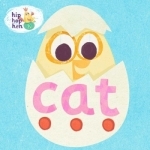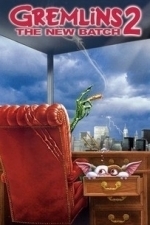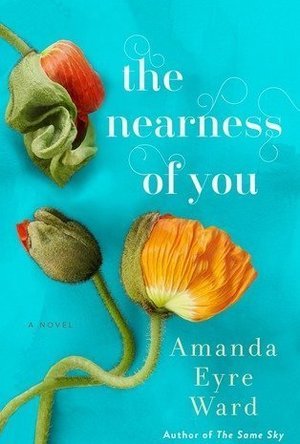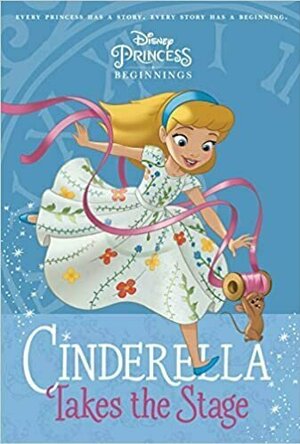Search
Search results
Matthew Krueger (10051 KP) rated Gremlins 2: The New Batch (1990) in Movies
Dec 22, 2020
Gremlins Take Over The Big Apple
Gremlins 2: The New Batch- is a good sequel. Its still has its dark humor, comedy, horror and of course many gremlins. And you cant not forgot about Hulk Hogan, yes you read that right Hulk Hogan is in this. And the horror legend and icon Christopher Lee is also in this.
The plot: The magical collectibles store that Gizmo calls home has just been destroyed, and the tiny monster finds his way into a newly erected skyscraper. Billy Peltzer (Zach Galligan) and his bride-to-be, Kate (Phoebe Cates), who have previously dealt with Gremlins run amok, discover that Gizmo and an impish legion of reptilian pals are inhabiting the downtown building. The couple tries to stop the creatures from escaping into New York City, but this new batch of beasts might be uncontrollable.
Like the first film, Gremlins 2: The New Batch is a live-action horror comedy film; however, Dante put effort into taking the sequel in new anarchistic directions. The film is meant to be more cartoon-like and less dark than the original, with slapstick violence, so the film received a PG-13 rating by the Motion Picture Association of America (MPAA). There are also a number of parodies of other films and stories, including Gremlins itself, the Rambo films, The Wizard of Oz, Marathon Man and The Phantom of the Opera.
Along with the main plot, there is animation by Chuck Jones in the film featuring the Looney Tunes characters Bugs Bunny, Daffy Duck and Porky Pig. Jones had actually quit animation before returning to work on Gremlins 2: The New Batch.Dante explained the animation at the beginning of the film was meant to "set the anarchic tone."
The first scene appears at the very beginning of the movie, and features the classic Looney Tunes opening card, causing people to assume it is the short cartoon that usually plays before a movie begins; however, when Bugs appears through the rings on top of the Warner Bros. shield, Daffy interrupts the intro, and steals the shield from Bugs. Daffy attempts to recreate the opening with himself in Bugs' place, but the shield overshoots, causing the entire title card to fall apart. Daffy surrenders the stardom, claiming that since he will not star in the cartoon, they might as well just skip straight to the movie. Bugs is willing to do so, and spins Daffy off screen like a spinning top for the movie title to appear.
The DVD and Blu-ray include a longer version of the cartoon short. In it, Daffy is informed by Bugs that he has been promoted to executive and is subsequently put in charge writing the title of the movie. When Daffy mistakenly writes the title Gremlins 2 as "Gremlin Stew", Bugs corrects the error. Daffy then attempts to rename the film The Return of Super-Daffy Meets Gremlins 2 Part 6: The Movie, but Bugs rejects this for being too long, changing it back to Gremlins 2 (rendered in the font of the official logo). Daffy then quits his new job and Bugs decides to add in the subtitle, saying it looks "a little skimpy". This material was removed from the film because early audiences expected a live-action film and were bewildered by the lengthy animated sequence.
Throughout the film's closing credits, Daffy pops into frame sporadically and spouts off sarcastic comments. The last scene appears after the credits, and again features the Looney Tunes rings. This time, Porky comes out of the rings and tries to say his usual "Th-th-th-that's all, folks!" However, Daffy interrupts again and takes over. After Daffy says the slogan, the back of the Warner Bros. shield, with the words, "Title Animation Written & Directed by Chuck Jones (with Chuck Jones' signature)", smashes him. He peeks his head out to the left side and says, "Fade out," and the segment ends.
Its a good film.
The plot: The magical collectibles store that Gizmo calls home has just been destroyed, and the tiny monster finds his way into a newly erected skyscraper. Billy Peltzer (Zach Galligan) and his bride-to-be, Kate (Phoebe Cates), who have previously dealt with Gremlins run amok, discover that Gizmo and an impish legion of reptilian pals are inhabiting the downtown building. The couple tries to stop the creatures from escaping into New York City, but this new batch of beasts might be uncontrollable.
Like the first film, Gremlins 2: The New Batch is a live-action horror comedy film; however, Dante put effort into taking the sequel in new anarchistic directions. The film is meant to be more cartoon-like and less dark than the original, with slapstick violence, so the film received a PG-13 rating by the Motion Picture Association of America (MPAA). There are also a number of parodies of other films and stories, including Gremlins itself, the Rambo films, The Wizard of Oz, Marathon Man and The Phantom of the Opera.
Along with the main plot, there is animation by Chuck Jones in the film featuring the Looney Tunes characters Bugs Bunny, Daffy Duck and Porky Pig. Jones had actually quit animation before returning to work on Gremlins 2: The New Batch.Dante explained the animation at the beginning of the film was meant to "set the anarchic tone."
The first scene appears at the very beginning of the movie, and features the classic Looney Tunes opening card, causing people to assume it is the short cartoon that usually plays before a movie begins; however, when Bugs appears through the rings on top of the Warner Bros. shield, Daffy interrupts the intro, and steals the shield from Bugs. Daffy attempts to recreate the opening with himself in Bugs' place, but the shield overshoots, causing the entire title card to fall apart. Daffy surrenders the stardom, claiming that since he will not star in the cartoon, they might as well just skip straight to the movie. Bugs is willing to do so, and spins Daffy off screen like a spinning top for the movie title to appear.
The DVD and Blu-ray include a longer version of the cartoon short. In it, Daffy is informed by Bugs that he has been promoted to executive and is subsequently put in charge writing the title of the movie. When Daffy mistakenly writes the title Gremlins 2 as "Gremlin Stew", Bugs corrects the error. Daffy then attempts to rename the film The Return of Super-Daffy Meets Gremlins 2 Part 6: The Movie, but Bugs rejects this for being too long, changing it back to Gremlins 2 (rendered in the font of the official logo). Daffy then quits his new job and Bugs decides to add in the subtitle, saying it looks "a little skimpy". This material was removed from the film because early audiences expected a live-action film and were bewildered by the lengthy animated sequence.
Throughout the film's closing credits, Daffy pops into frame sporadically and spouts off sarcastic comments. The last scene appears after the credits, and again features the Looney Tunes rings. This time, Porky comes out of the rings and tries to say his usual "Th-th-th-that's all, folks!" However, Daffy interrupts again and takes over. After Daffy says the slogan, the back of the Warner Bros. shield, with the words, "Title Animation Written & Directed by Chuck Jones (with Chuck Jones' signature)", smashes him. He peeks his head out to the left side and says, "Fade out," and the segment ends.
Its a good film.
ArecRain (8 KP) rated Making Waves (League of 7, #1) in Books
Jan 18, 2018
As a first erotic novel, I believe this was a great choice. I bought this book years ago when I was still young and terrified about my parents finding out. I was just a freshman in high school looking for something that normal romance novels couldnt give me. I was so tired of all the sugary innuendoes. If I am going to read about people having sex, I want clear descriptions about what is going on or nothing at all. Innuendoes that compare a ladys part to food just grosses me out; and comparing an orgasm to an explosion of stars is just silly. Of course, I thought all this before I lost my
virginity at the ripe old age of 19 (yay for beating teen pregnancy?) And, I still think this today.
But I digress. This book is actually an anthology of two stories by different authors, both stories water related. Thus, the title.
The first story is titled Liquid Dreams by Cathryn Fox. From the very first page, Fox jumps right into the sex. When I first read it, I felt so scandalous that I knew my cheeks were red from embarrassment. Now, looking back, I realize how silly I was considering I have read much more graphic scenes since. Liquid Dreams does not want of sex scene. In fact, I am pretty sure that 85% of the novel is about the main characters partaking in foreplay. Another 10% is devoted to sex.
The plot consists of a young woman, Katrina, who keeps having dreams about a man that comes to her out of the sea. He pleases her, she pleases him. And then, by swallowing his semen, she starts regaining memories from a past life. Eventually, she figures out that the man, Ranek, is her lover from that. She also gradually realizes that she has been horribly miserable with her life because it is not her true life. The only problem is Raneks brother is hell-bent on seeing them both suffer.
A pretty straight forward plot with no twists or surprises and plenty of steamy sex scenes to call it erotic. The only problem I had with this novel was the way she covered her memories. Everything else was pretty believable for a fantasy erotic novel except that. In fact, it was pretty weird.
The second novel is called Dolphins Playground by Jaci Burton. At first, I was a little hesitant to read it just because of the title, but I sucked it up and read on. Unlike Fox, Burton is more about the plot-line than sex. This short story is about a marine biologist, Jasmine, who would rather spend her time with dolphins than people, especially her big wig boss who cares more about than living things. When she finds some sick dolphins, she decides to take them in much to the chagrin of her soon to be lover, Triton. Triton just so happens to be able to turn into a dolphin and is able to communicate with them. In fact, the dolphins that are now in Jasmines custody actually belong to Triton, who is also trying to find a cure with the diseased dolphins.
Since he cant get the dolphins out of the facility, Triton decides to use it, and Jasmine, to his advantage in his search for the cure. They, of course, hook up during this search and do end up having a happy ending.
The writing was pretty simple in terms of vocabulary and biology terms. However, I really enjoyed Triton and Jasmines witty banter and that the you could cut the sexual tension between them with a knife. It was the characters that made this story, honestly.
virginity at the ripe old age of 19 (yay for beating teen pregnancy?) And, I still think this today.
But I digress. This book is actually an anthology of two stories by different authors, both stories water related. Thus, the title.
The first story is titled Liquid Dreams by Cathryn Fox. From the very first page, Fox jumps right into the sex. When I first read it, I felt so scandalous that I knew my cheeks were red from embarrassment. Now, looking back, I realize how silly I was considering I have read much more graphic scenes since. Liquid Dreams does not want of sex scene. In fact, I am pretty sure that 85% of the novel is about the main characters partaking in foreplay. Another 10% is devoted to sex.
The plot consists of a young woman, Katrina, who keeps having dreams about a man that comes to her out of the sea. He pleases her, she pleases him. And then, by swallowing his semen, she starts regaining memories from a past life. Eventually, she figures out that the man, Ranek, is her lover from that. She also gradually realizes that she has been horribly miserable with her life because it is not her true life. The only problem is Raneks brother is hell-bent on seeing them both suffer.
A pretty straight forward plot with no twists or surprises and plenty of steamy sex scenes to call it erotic. The only problem I had with this novel was the way she covered her memories. Everything else was pretty believable for a fantasy erotic novel except that. In fact, it was pretty weird.
The second novel is called Dolphins Playground by Jaci Burton. At first, I was a little hesitant to read it just because of the title, but I sucked it up and read on. Unlike Fox, Burton is more about the plot-line than sex. This short story is about a marine biologist, Jasmine, who would rather spend her time with dolphins than people, especially her big wig boss who cares more about than living things. When she finds some sick dolphins, she decides to take them in much to the chagrin of her soon to be lover, Triton. Triton just so happens to be able to turn into a dolphin and is able to communicate with them. In fact, the dolphins that are now in Jasmines custody actually belong to Triton, who is also trying to find a cure with the diseased dolphins.
Since he cant get the dolphins out of the facility, Triton decides to use it, and Jasmine, to his advantage in his search for the cure. They, of course, hook up during this search and do end up having a happy ending.
The writing was pretty simple in terms of vocabulary and biology terms. However, I really enjoyed Triton and Jasmines witty banter and that the you could cut the sexual tension between them with a knife. It was the characters that made this story, honestly.

hip hop hen: phonics 1 CVC
Education and Games
App
PHONICS APPS CREATED BY TEACHERS in the UK We are very excited to bring to you: “phonics 1 CVC”....

The Elements by Theodore Gray
Book and Education
App
Of all the periodic table apps, there is only one which Stephen Fry described as “Alone worth the...

Audio Books by Audiobooks
Book and Entertainment
App
Wish you could read more but don’t have the time? You’ll love audiobooks! Audiobooks.com is the...
Rachel King (13 KP) rated Fantasy (Includes: Leopard People, #0.5; Midnight, #0.5) in Books
Feb 11, 2019
The fantasy theme was heavy with all four of the stories in the book. The first story is The Widow's Auction by Sabrina Jeffries. In this novella, a young widow is convinced that it is in her favor to auction off one night with her in return for a large sum of money that she can use to benefit her work with a all-boys' school. Of course, she secretly just wants to know what it's like to actually enjoy the bedtime act. In the realm of make-believe, this was quite the enjoyable mix of lust and romance with no negative consequences.
The second story is Luisa's Desire by Emma Holly. In this fascinating read, an immortal woman seeks an alternative to her need for blood to survive in a remote lamasery buried in the Himalayan mountains of Tibet. While she assumes that the answer is a particular form of meditation, what she instead gets is an aspiring monk who possesses a much more fleshly solution to her problem. Reincarnation takes on a whole new meaning in this short story, and I found the different take on vampires in fiction to be well-written.
The third story is Mr. Speedy by Elda Minger. In this plot, an ambitious young woman decides to make herself over into a man in order to sneak into and cover a male-only conference entirely about getting a woman to go to bed with the man. Her genius plan takes a left-turn when she discovers she is rooming with the city's most eligible bachelor coming off of a horrid divorce - whom she is overwhelmingly attracted to. The irony of this story is that the bachelor becomes increasingly interested in her before he is even aware she is in disguise. The humor of this story made it quite charming in a sexy sort of way.
The final story is The Awakening by Christine Feehan. The story begins her series, the Leopard People, with the tale of a young veterinarian lured deep into the jungle to track down her inheritance. Heavy lust and desire take over quite early in the story as the reader discovers that her presence there has been manipulated by a man of the leopard people who has already claimed her for his mate. The intensity and over-dramatization in the writing made this story less enjoyable for me than the others. I was also put off by the man's extreme obsession with the woman and his reluctance to tell her what was happening to her right from the beginning.
The second story is Luisa's Desire by Emma Holly. In this fascinating read, an immortal woman seeks an alternative to her need for blood to survive in a remote lamasery buried in the Himalayan mountains of Tibet. While she assumes that the answer is a particular form of meditation, what she instead gets is an aspiring monk who possesses a much more fleshly solution to her problem. Reincarnation takes on a whole new meaning in this short story, and I found the different take on vampires in fiction to be well-written.
The third story is Mr. Speedy by Elda Minger. In this plot, an ambitious young woman decides to make herself over into a man in order to sneak into and cover a male-only conference entirely about getting a woman to go to bed with the man. Her genius plan takes a left-turn when she discovers she is rooming with the city's most eligible bachelor coming off of a horrid divorce - whom she is overwhelmingly attracted to. The irony of this story is that the bachelor becomes increasingly interested in her before he is even aware she is in disguise. The humor of this story made it quite charming in a sexy sort of way.
The final story is The Awakening by Christine Feehan. The story begins her series, the Leopard People, with the tale of a young veterinarian lured deep into the jungle to track down her inheritance. Heavy lust and desire take over quite early in the story as the reader discovers that her presence there has been manipulated by a man of the leopard people who has already claimed her for his mate. The intensity and over-dramatization in the writing made this story less enjoyable for me than the others. I was also put off by the man's extreme obsession with the woman and his reluctance to tell her what was happening to her right from the beginning.
The Devotionals (1 more)
The Research
I don’t often review non-fiction books. It’s just not something I like to do. I’m a fiction gal. I love reading a book where I can lost and escape reality for a few hours a day. But, when I have a favorite author, such as Jill Eileen Smith, I will give even a non-fiction book a try. And, I was actually rather excited to read this one, because let me tell you. My life, definitely does not match my dreams. Sure, I have a wonderful husband and two amazing children and a loving father and two gorgeous sisters. But, my health is not great, and my dreams? I dream so much more than this. I fell like I’ll be like this forever and never accomplish anything.
Smith has done a wonderful job with this book. It brings us the stories of 12 women of the Bible and how they dreamed for so much more, but it didn’t match up to what God had in store for them. You see, He is the creator of us all and He is the one that can see our future, know our plans, know what our lives will be like. And, through the tender words that Smith uses, along with the 12 women and phenomenal research she incorporated into the book, we see how life can be when we are disappointed that our dreams are following into line with our life.
Through this devotional, I was able to better understand my own life. I know what I want, I know what I wish I had, I know that I’m going to be disappointed because I’m not fully relying on God to help me with that. If I trust in Him, if I seek out his love and guidance, I won’t be so disappointed when a hope or dream falls short. Smith has once again used her incredible talent to hook me on a book. Her research is exquisite and her writing is filled with emotion and raw feelings.
This is a 5 star devotional book I would recommend to all the women out there. Get lost among the pages, see how these 12 women made mistakes, made choices that effect them and their families and see what God had in store for them. You may find the same hope and encouragement I did. Definitely a book for the keeper shelf and one I’ll share with my family and friends!
*I received a complimentary copy of this book from Revell Publishing and was under no obligation to post a review, positive or negative.*
Smith has done a wonderful job with this book. It brings us the stories of 12 women of the Bible and how they dreamed for so much more, but it didn’t match up to what God had in store for them. You see, He is the creator of us all and He is the one that can see our future, know our plans, know what our lives will be like. And, through the tender words that Smith uses, along with the 12 women and phenomenal research she incorporated into the book, we see how life can be when we are disappointed that our dreams are following into line with our life.
Through this devotional, I was able to better understand my own life. I know what I want, I know what I wish I had, I know that I’m going to be disappointed because I’m not fully relying on God to help me with that. If I trust in Him, if I seek out his love and guidance, I won’t be so disappointed when a hope or dream falls short. Smith has once again used her incredible talent to hook me on a book. Her research is exquisite and her writing is filled with emotion and raw feelings.
This is a 5 star devotional book I would recommend to all the women out there. Get lost among the pages, see how these 12 women made mistakes, made choices that effect them and their families and see what God had in store for them. You may find the same hope and encouragement I did. Definitely a book for the keeper shelf and one I’ll share with my family and friends!
*I received a complimentary copy of this book from Revell Publishing and was under no obligation to post a review, positive or negative.*
Kristy H (1252 KP) rated The Nearness of You in Books
Feb 13, 2018
Suzette and Hyland have a happy marriage and a busy life when Hyland surprises his wife with the news that he really wants a child. Married fifteen years, children had always been off the table, as Suzette did not want to pass on the genes of her mother, a woman who gave Suzette a horrifying and unstable childhood and eventually wound up in a mental institution. But Hyland proposes a new solution: what if they use a surrogate, with his sperm and a surrogate's egg? Suzette, a busy and successful heart surgeon, reluctantly agrees. Even though there are some red flags, the couple eventually chooses young Dorrie, a woman who wants to use the surrogate fees to go to college. Dorrie and Hyland bond, and Suzette realizes she must get on board with the idea. But soon Dorrie will make some decisions that will affect everyone in this new trio.
I am a bit conflicted about this novel. Ward wrote [book:The Same Sky|22716408], which is a beautiful novel and one everyone should read in this current political climate. It's hard not to compare others to that magical book, and this one did fall short. She does, however, have a way of weaving stories with her words, and while I wasn't nearly as attached to the characters in this novel, I still found myself reading the last half of the book somewhat compulsively.
The novel started out slow, but picked up about 1/4 through, with a twist in the plot. It's told from a shifting rotation of perspectives, including Suzette, Dorrie, and Hyland. There are some large shifts in time as the novel progresses, which did make it harder to attach to some of the characters. None of the plot twists are exactly surprise, as they are foreshadowed a bit in each character's description: this is more of a character-driven novel versus a shocking dramatic novel. Still, even though I tore through the last half of the novel, I just felt the book lacked something, and I felt a tad let down by a story and characters that weren't completely fully developed (the ending is a bit abrupt as well). I enjoyed the perspectives on motherhood that the novel offered, but felt there could be more. That's not to say the novel isn't worth reading; Ward is a wonderful writer, but I just felt a little perplexed and frustrated when this one ended. I had hoped for more.
I received a copy of this novel from the publisher and Netgalley (thank you!); it is available everywhere as of 02/21/2017.
I am a bit conflicted about this novel. Ward wrote [book:The Same Sky|22716408], which is a beautiful novel and one everyone should read in this current political climate. It's hard not to compare others to that magical book, and this one did fall short. She does, however, have a way of weaving stories with her words, and while I wasn't nearly as attached to the characters in this novel, I still found myself reading the last half of the book somewhat compulsively.
The novel started out slow, but picked up about 1/4 through, with a twist in the plot. It's told from a shifting rotation of perspectives, including Suzette, Dorrie, and Hyland. There are some large shifts in time as the novel progresses, which did make it harder to attach to some of the characters. None of the plot twists are exactly surprise, as they are foreshadowed a bit in each character's description: this is more of a character-driven novel versus a shocking dramatic novel. Still, even though I tore through the last half of the novel, I just felt the book lacked something, and I felt a tad let down by a story and characters that weren't completely fully developed (the ending is a bit abrupt as well). I enjoyed the perspectives on motherhood that the novel offered, but felt there could be more. That's not to say the novel isn't worth reading; Ward is a wonderful writer, but I just felt a little perplexed and frustrated when this one ended. I had hoped for more.
I received a copy of this novel from the publisher and Netgalley (thank you!); it is available everywhere as of 02/21/2017.
Xanderath (690 KP) rated the Xbox One version of Assassin's Creed: Odyssey in Video Games
Feb 5, 2020
Always choose the love option
Contains spoilers, click to show
I recieved this game through a @Smashbomb giveaway. I had never been very interested in assassin's creed having only played a bit of number 2 and freedom cry, but i wanted to give it a shot. Im glad i did because its become one of my favourite games ive ever played.
To start out you pick between either Alexios or Kassandra, i chose Alexios and have yet to experience Kassandra because even after restarting the main story i loved Alexios so much i kept him. So the game starts you on a small island called Kephalonia, which is a nice starting area with some basic quests and nice scenery. We get a bit of background on the hero's character and his motivation as we progress, once you get a ship you can pretty much explore anywhere on the map. i wouldnt recommend it though because the map is HUGE and there are plenty of areas that will kick your butt. Ive always been the kind of player to complete all the side quests, but there are so many in this game i kind of decided to plough on with the main story line, only to find out there are actually 3. The first "odyssey" is based around reuniting your family and if you make the right choices throughout the game this is achievable. its interesting to see how some choices turn out because honestly they werent always expected. The second "odyssey" is about destroying a cult of nutjobs that are responsible for a decent amount of tragedy both personal to Alexios and to the greater nation of greece. The third "odyssey" is somewhat disapointingly short but has some difficult boss fights. It is about gaining entrance to Atlantis the lost city and finding Alexios' real father. Overall the stories are very entertaining and i thoroughly enjoyed the inclusion of real historical figures such as herodotus and pythagorus.
Ive had so much fun in this game just sailing around or riding my magical horses, there is just soo much to do, but not in the overwhelming way. Ubisoft have done a great job making a magical game that is funny and gripping and exciting to play, i even learned some greek swearwords xD
I would recommend this game to anyone who likes fantasy, open worlds, stealth or just violence. 10/10 from me.
To start out you pick between either Alexios or Kassandra, i chose Alexios and have yet to experience Kassandra because even after restarting the main story i loved Alexios so much i kept him. So the game starts you on a small island called Kephalonia, which is a nice starting area with some basic quests and nice scenery. We get a bit of background on the hero's character and his motivation as we progress, once you get a ship you can pretty much explore anywhere on the map. i wouldnt recommend it though because the map is HUGE and there are plenty of areas that will kick your butt. Ive always been the kind of player to complete all the side quests, but there are so many in this game i kind of decided to plough on with the main story line, only to find out there are actually 3. The first "odyssey" is based around reuniting your family and if you make the right choices throughout the game this is achievable. its interesting to see how some choices turn out because honestly they werent always expected. The second "odyssey" is about destroying a cult of nutjobs that are responsible for a decent amount of tragedy both personal to Alexios and to the greater nation of greece. The third "odyssey" is somewhat disapointingly short but has some difficult boss fights. It is about gaining entrance to Atlantis the lost city and finding Alexios' real father. Overall the stories are very entertaining and i thoroughly enjoyed the inclusion of real historical figures such as herodotus and pythagorus.
Ive had so much fun in this game just sailing around or riding my magical horses, there is just soo much to do, but not in the overwhelming way. Ubisoft have done a great job making a magical game that is funny and gripping and exciting to play, i even learned some greek swearwords xD
I would recommend this game to anyone who likes fantasy, open worlds, stealth or just violence. 10/10 from me.
Lottie disney bookworm (1056 KP) rated Cinderella Takes the Stage in Books
Apr 26, 2020
This childhood tale of Cinderella is simple and light-hearted with beautiful sentiments and messages throughout: perfect for the little reader in your lives. The illustrations by Adrienne Brown are also incredibly beautiful, with pumpkin carriage watermarks and gorgeous details on each page.
Ella is a young girl, surrounded by the love of her parents in a fairly privileged surrounding. Her days are filled with stories about magic, playing with her new puppy Bruno, taking tea with her parents and preparing for the upcoming puppet competition at the midsummer festival.
It is this competition which is the focus of the short tale, as Cinderella displays her sheer determination to compete and win the prized gold coin, despite her lack of talents in sewing and a puppet which, in her words, looks like a potato.
This determination makes the character of Cinderella inspirational to the young reader, whether they realise that at the time or not. Yes her coveted possession is a silver and gold dress but, despite the tales of magic and fairies that surround her, she does not rely on wishes or her parents to obtain the dress: her sole plan is to earn the gold coin through winning the competition and purchase the dress herself, a refreshing change from the bibbidi, bobbidi boo methods which Tessa Roehl could have so easily reverted to.
Cinderella is not quite perfect though and can be headstrong in her beliefs: quickly jumping to conclusions when she meets a girl her own age who is not quite as well off as herself. As a mother to a seven-year-old, I can readily believe this! Luckily, Cinderella’s parents believe that there is good in every person, a theme which mirrors the original tale and films. Thus, Cinderella learns more about the little girl: significantly benefitting from both the practical lessons which the girl can offer; an insight into the world around her which is not straight out of a fairytale; and finally, the laughter, love and secrets that a childhood friendship offers.
Cinderella and Val are from different worlds, they find beauty in different things and their dreams could not be further apart. However, this does not limit their common interests or indeed their friendship in any capacity and this is something we should all instil in our children. As Tessa Roehl so beautifully puts it: “Our hearts don’t always need to want the same thing. As long as they want something.”
Ella is a young girl, surrounded by the love of her parents in a fairly privileged surrounding. Her days are filled with stories about magic, playing with her new puppy Bruno, taking tea with her parents and preparing for the upcoming puppet competition at the midsummer festival.
It is this competition which is the focus of the short tale, as Cinderella displays her sheer determination to compete and win the prized gold coin, despite her lack of talents in sewing and a puppet which, in her words, looks like a potato.
This determination makes the character of Cinderella inspirational to the young reader, whether they realise that at the time or not. Yes her coveted possession is a silver and gold dress but, despite the tales of magic and fairies that surround her, she does not rely on wishes or her parents to obtain the dress: her sole plan is to earn the gold coin through winning the competition and purchase the dress herself, a refreshing change from the bibbidi, bobbidi boo methods which Tessa Roehl could have so easily reverted to.
Cinderella is not quite perfect though and can be headstrong in her beliefs: quickly jumping to conclusions when she meets a girl her own age who is not quite as well off as herself. As a mother to a seven-year-old, I can readily believe this! Luckily, Cinderella’s parents believe that there is good in every person, a theme which mirrors the original tale and films. Thus, Cinderella learns more about the little girl: significantly benefitting from both the practical lessons which the girl can offer; an insight into the world around her which is not straight out of a fairytale; and finally, the laughter, love and secrets that a childhood friendship offers.
Cinderella and Val are from different worlds, they find beauty in different things and their dreams could not be further apart. However, this does not limit their common interests or indeed their friendship in any capacity and this is something we should all instil in our children. As Tessa Roehl so beautifully puts it: “Our hearts don’t always need to want the same thing. As long as they want something.”





